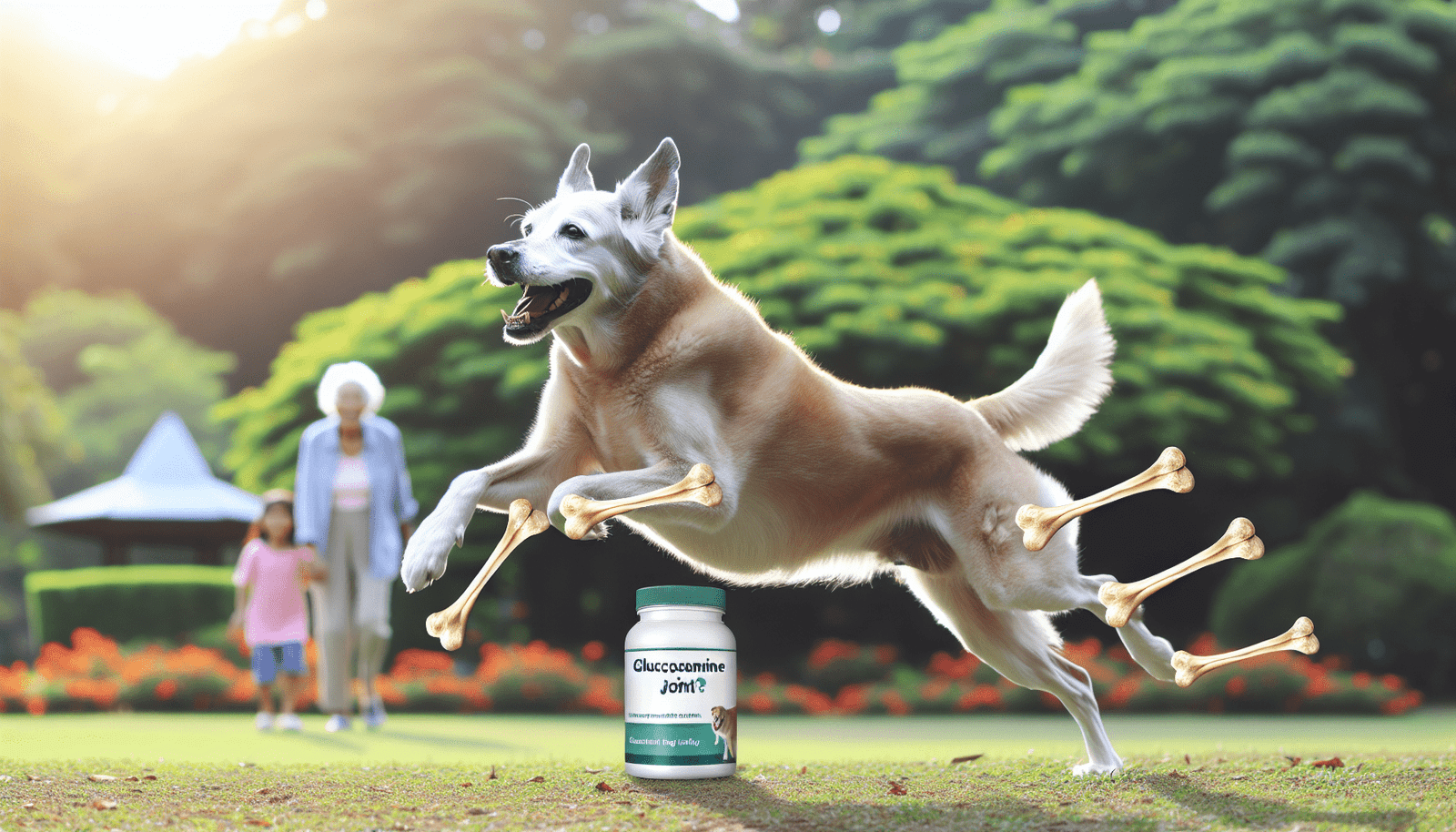
In “How Glucosamine Can Improve Your Dog’s Joint Health,” you’ll discover how this powerful supplement can significantly enhance your furry friend’s mobility and overall well-being. Glucosamine is a cornerstone in canine wellness, proven to support healthy joints and cartilage, especially in senior dogs experiencing arthritis or hip dysplasia. With insights from veterinarians and real-life success stories, this article explores how incorporating glucosamine into your dog’s diet can help maintain their active lifestyle, strengthen immunity, and ensure a happier, healthier life. Uncover the science behind why glucosamine works and how it can be a game-changer for dogs of all ages. Have you ever noticed your beloved dog struggling to get up after lying down for a while? Or maybe they’ve slowed down on your favorite walks together? It’s heartbreaking to see our furry friends in discomfort, but there’s hope with a little supplement called glucosamine.
Understanding Glucosamine
Glucosamine is a natural compound found in your dog’s body, primarily around the joints and cartilage. It’s crucial for maintaining healthy and functioning joints. When your dog doesn’t produce enough of it, you might start noticing signs of joint issues.
What Exactly is Glucosamine?
Glucosamine is an amino sugar that plays a vital role in building cartilage, the tissue that cushions your dog’s joints. There are a few different forms, including glucosamine sulfate, glucosamine hydrochloride, and N-acetylglucosamine, with glucosamine sulfate being the most commonly used in supplements.
Why Do Dogs Need Glucosamine?
As dogs age, their natural glucosamine production decreases, leading to joint wear and tear. This reduction can result in pain, stiffness, and sometimes even mobility issues. Certain breeds are more prone to joint problems due to their genetic predisposition and physical structure.
The Science Behind Glucosamine for Dogs
Common Joint Problems in Dogs
Joint issues in dogs can stem from various causes, such as aging, genetics, weight, and overactivity. Here are some common joint problems that can affect your dog:
| Joint Issue | Description |
|---|---|
| Osteoarthritis | A degenerative joint disease where the cartilage wears away |
| Hip Dysplasia | Abnormal formation of the hip socket, common in larger breeds |
| Elbow Dysplasia | Abnormal development of the elbow joint |
| Patellar Luxation | A condition where the kneecap dislocates or moves out of its normal location |
How Glucosamine Works
Glucosamine supplements can help replenish the body’s supply of this crucial compound. By providing the building blocks necessary for cartilage repair, these supplements can help alleviate pain, improve joint function, and promote overall joint health.
Research and Effectiveness
Numerous studies support the benefits of glucosamine for dogs. For example, a study published in the Journal of the American Veterinary Medical Association found that dogs that received glucosamine and chondroitin supplementation experienced significant improvements in joint pain and mobility compared to those that did not.
Benefits of Glucosamine for Your Dog
Improved Joint Health
By supporting cartilage repair and maintenance, glucosamine helps keep your dog’s joints healthy. This support is especially important for older dogs or breeds prone to joint problems.
Reduced Pain and Inflammation
Glucosamine is known to help reduce the symptoms of osteoarthritis, including pain and inflammation. This relief can make a significant difference in your dog’s quality of life, allowing them to move more freely and comfortably.
Better Mobility
With improved joint health and reduced pain, your dog will likely experience better mobility. This improvement means they can continue to enjoy their daily walks, play sessions, and simply getting up and down without difficulty.
How to Choose the Right Glucosamine Supplement
Forms of Glucosamine Supplements
Glucosamine supplements come in various forms, making it easy to incorporate them into your dog’s daily routine. Some common forms include:
| Form | Description |
|---|---|
| Chewable Tablets | Easy-to-administer tablets that can be given as treats |
| Capsules | Can be opened and mixed with food or given whole |
| Liquid | Can be added to your dog’s food or water |
| Powders | Can be sprinkled onto your dog’s food |
Key Ingredients to Look For
When choosing a glucosamine supplement, it’s essential to look for high-quality ingredients. Some key ingredients to look for include:
- Glucosamine Sulfate: The most common and effective form of glucosamine.
- Chondroitin Sulfate: Often combined with glucosamine, this compound helps reduce inflammation and supports cartilage structure.
- MSM (Methylsulfonylmethane): An organic sulfur compound that can help reduce inflammation and support joint health.
NASC Quality Seal
Look for supplements that have the National Animal Supplement Council (NASC) quality seal. This seal ensures that the product meets high standards for quality, safety, and efficacy.
How to Administer Glucosamine to Your Dog
Determining the Right Dosage
The correct dosage of glucosamine depends on your dog’s size, weight, and specific health needs. Always consult your veterinarian before starting any new supplement regimen to ensure you’re giving the appropriate amount.
Tips for Administering Glucosamine
Administering glucosamine can be easy with these tips:
- Hide the tablet or capsule in a treat or piece of food your dog loves.
- Mix liquid or powder forms into your dog’s food.
- Use a chewable tablet that doubles as a treat, making it a fun experience for your dog.
Combining Glucosamine with Other Supplements
Chondroitin
Often paired with glucosamine, chondroitin works to enhance joint health by preventing cartilage breakdown and supporting its repair.
Omega-3 Fatty Acids
Omega-3 fatty acids, found in fish oil, can help reduce inflammation and support overall joint health. These healthy fats can work synergistically with glucosamine to promote better joint function.
| Supplement | Role in Joint Health |
|---|---|
| Glucosamine | Supports cartilage repair and maintenance |
| Chondroitin | Prevents cartilage breakdown and supports repair |
| Omega-3 Fatty Acids | Reduces inflammation and supports overall joint health |
| MSM | Reduces inflammation and supports joint health |
Multivitamins
A well-rounded multivitamin can ensure your dog is receiving all the essential nutrients they need for optimum health. Many multivitamins include vitamins and minerals that support joint health in addition to other benefits.
Ensuring Your Dog’s Overall Health and Well-being
Balanced Diet
Ensuring your dog has a balanced diet is crucial. A diet rich in essential nutrients, including proteins, vitamins, and minerals, contributes to overall health and can support joint health.
Regular Exercise
Regular exercise helps keep your dog’s joints flexible and muscles strong. Tailor the type and intensity of exercise to your dog’s age, breed, and health condition to avoid overexertion.
Weight Management
Maintaining a healthy weight is essential for joint health. Extra weight puts additional stress on your dog’s joints, exacerbating issues like osteoarthritis. Ensure you provide well-portioned meals and healthy treats.
Regular Veterinary Check-ups
Regular veterinary check-ups can help detect and address health issues early. Your vet can provide guidance on your dog’s diet, exercise routine, and any additional supplements that might benefit their health.
Vaccinations and Preventative Care
Keeping up with vaccinations and preventative care like dental cleanings and parasite control is essential for your dog’s overall health. A healthy dog is more likely to have healthier joints.
Common Questions About Glucosamine for Dogs
Is Glucosamine Safe for Dogs?
Glucosamine is generally safe for dogs when given in appropriate dosages. However, it’s always best to consult your veterinarian before starting any new supplement to ensure it’s right for your dog.
How Long Does It Take to See Results?
Results can vary depending on the severity of your dog’s joint issues and the specific supplement used. Some dogs may start to see improvements in as little as a few weeks, while others might take a couple of months.
Can Young Dogs Benefit from Glucosamine?
Absolutely! Young dogs, especially breeds prone to joint issues, can benefit from glucosamine as a preventative measure. Starting early can help maintain healthy joints and potentially prevent issues down the road.
Are There Any Side Effects?
Side effects of glucosamine are rare but can include gastrointestinal upset, such as diarrhea or vomiting. If you notice any adverse reactions, discontinue use and consult your veterinarian.
Conclusion
Supporting your dog’s joint health with glucosamine can make a significant difference in their quality of life. Whether they are young or old, providing this beneficial supplement can help ensure their joints stay healthy and functional. Always remember to consult your veterinarian before starting any new supplementation and follow their guidance on the best dosage and form for your dog’s needs.
By taking proactive steps with glucosamine and other supportive measures, you can help your furry friend enjoy a happy, active, and comfortable life.







